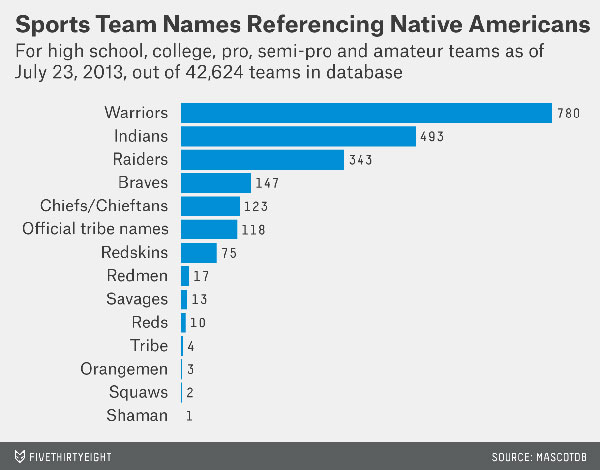
May 17, 2019; Washington Post
Maulian Dana tells Samantha Pell of the Washington Post that she was drawn to activism after attending a high school basketball game between the “Indians” and the “Warriors” 20 years ago, when she was 15. Dana, who’s a member of the Penobscot Nation, remembers feeling angry as she watched students chanting and dancing in fake feathers and war paint, effectively mocking and degrading traditions she held sacred.
Now, Dana is a tribal ambassador of the Penobscot Nation, which spearheaded the drafting of a bill signed into law last Thursday by Democratic Maine Governor Janet Mills that prohibits the use of American Indian mascots in all public schools, colleges, and universities statewide. Maine is the first state to pass such a law. The ban will take effect 90 days after the state legislature adjourns.
The bill, which is only a single sentence long, reads as follows: “A public school may not have or adopt a name, symbol, or image that depicts or refers to a Native American tribe, individual, custom or tradition and that is used as a mascot, nickname, logo, letterhead or team name of the school.”
The vote in the state legislature was unanimous, but the issue has attracted controversy in Maine at the local level. Last March, Pell notes, Maine made headlines when the high school board in Skowhegan, after a years-long debate, voted by a 14–9 margin to retire its “Indians” mascot. Pell says the high school was the last in the state to have such a mascot.
Portland-based state Representative Benjamin Collings, who authored the legislation, said at the signing ceremony, “I am deeply proud of the steps our legislature has taken this session to finally honor Maine’s tribes in the way they should be honored. Our tribal communities laid the foundation of our state. They are people, not mascots.”
Sign up for our free newsletters
Subscribe to NPQ's newsletters to have our top stories delivered directly to your inbox.
By signing up, you agree to our privacy policy and terms of use, and to receive messages from NPQ and our partners.
The move to ban these mascots also comes on the heels of a vote last month by Maine’s legislature to replace Columbus Day with indigenous Peoples’ Day.
The legislation may be simple, but the issues behind it are not. According to a 2013 report from the National Congress of American Indians, nationally nearly 1,000 schools maintain American Indian-related mascots (some estimates are even higher). The American Psychological Association (APA) in 2005 took a position against the use of American Indian mascots, noting that such mascots undermine “the educational experiences of members of all communities—especially those who have had little or no contact with indigenous peoples.” The APA added that:
- “The symbols, images and mascots teach non-Indian children that it’s acceptable to participate in culturally abusive behavior and perpetuate inaccurate misconceptions about American Indian culture.”
- “Establishes an unwelcome and often times hostile learning environment for American Indian students that affirms negative images/stereotypes that are promoted in mainstream society.”
The APA also cites the work of psychologist Stephanie Fryberg, now at the University of Washington, whose research has found that, “American Indian mascots are harmful not only because they are often negative, but because they remind American Indians of the limited ways in which others see them. This in turn restricts the number of ways American Indians can see themselves.” (The text of the full APA statement is available here.)
“I think on the federal level something should be done as well,” Collings told Pell. “In Maine, we just realized that it is a distraction, is harmful, and not needed. We wanted to affirm what every town in the state has said so far. It is harmful and there is no place for it.”
Darren Ranco, chair of Native American Programs at the University of Maine, credits a grassroots movement in the state over last two decades for helping lead to the ban’s passage. Ranco and Dana both indicated that they hope Maine’s bill will spur similar legislation in other states.—Steve Dubb













